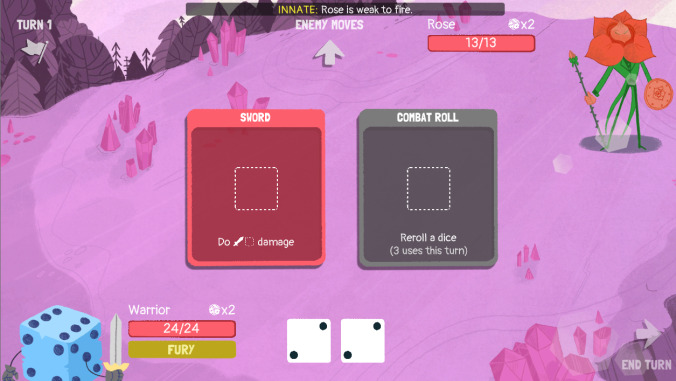Randomness in video games has always been a 20-sided sword; too little, and it can feel like players are merely “playing” their way through a glorified and expensive spreadsheet. Too much, and you might as well have not been there in the first place, easily replaced by a disembodied arm pulling a slot machine’s lever. (And somewhere, some loot box designer just got the most evil shiver imaginable rolling down their spine.) That’s why good video games that rely on luck give players a way to even the odds a little bit. Great games about luck, it turns out, embrace it whole hog.
Terry Cavanagh’s Dicey Dungeons—which came out of Early Access on Steam just a few weeks ago—is an excellent game about luck. (Maintaining, along with VVVVVV and Super Hexagon, Cavanagh’s irritating streak of game design perfection.) As the name implies, there are dice, and there’s a dungeon, and managing the interplay between the two is where all the fun stuff happens. Every turn, your cheerfully doomed characters—all of whom have been rendered into talking ambulatory cubes by the power of a game show-hosting demigod—roll a handful of their fellow dice, then plug them into their equipment in order to trigger damaging, defensive, and otherwise helpful effects. Thus does Cavanagh find the perfect marriage between randomness and strategy, since, while the numbers you’re handed every round are random, what you do with them—and what you have available to do things with them with—is entirely in your control.
There are many things to recommend Dicey Dungeons—the aesthetics are cheerful and gorgeous, and the ways the game finds to mechanically differentiate and add complexity to its shockingly varied roster of characters are a masterclass in doing a lot with a basic set of tools—but it all feeds off that core: “Here are some dice. Now, what do you want to do with them?” In that sense, Dicey Dungeons is of a piece with other fate-manipulating games that have popped out of the indie roguelike space in recent years, titles like Into The Breach and Slay The Spire, which offer up randomized encounters with planet-devouring bugs or eldritch monstrosities, and then give the player tools to respond to and control the hostile chaos. Breach and Spire manifest this by deciding what its baddies are going to do next, and then explicitly telling the player what those actions will be—the better to prevent them. Dicey flips that script; you put together your deck of powers, and then the dice decide how you’ll fare.
That should be far more nerve-wracking—you’ve got less control, after all—but the end result is actually way more breezy, maybe even compulsive. (If we understood, for even half a second, how the game of craps worked, you can rest assured we’d make a joking reference to the addictive aspects of dice-based gambling here.) For one thing, Dicey Dungeons is all about allowing you to manipulate and use the results of pretty much any roll; a low value and a “bad” value can be two very different things, when you’re trying to power a fire spell that won’t accept 6’s. And for another, there’s always the pleasant, responsibility-absolving aspect of randomness to help you take off that edge. When a Vek eats thousands of people in Into The Breach, you can’t help but feel like it’s your fault. (You had all the clues!) When things go wrong in Dicey Dungeons, you can always just blame the dice—even when you are the dice, as it turns out.



















![Rob Reiner's son booked for murder amid homicide investigation [Updated]](https://img.pastemagazine.com/wp-content/avuploads/2025/12/15131025/MixCollage-15-Dec-2025-01-10-PM-9121.jpg)





















